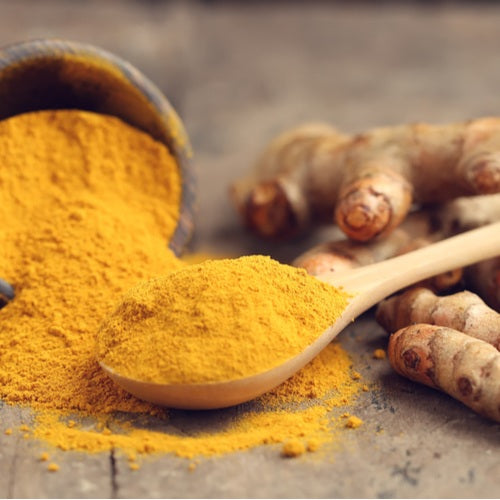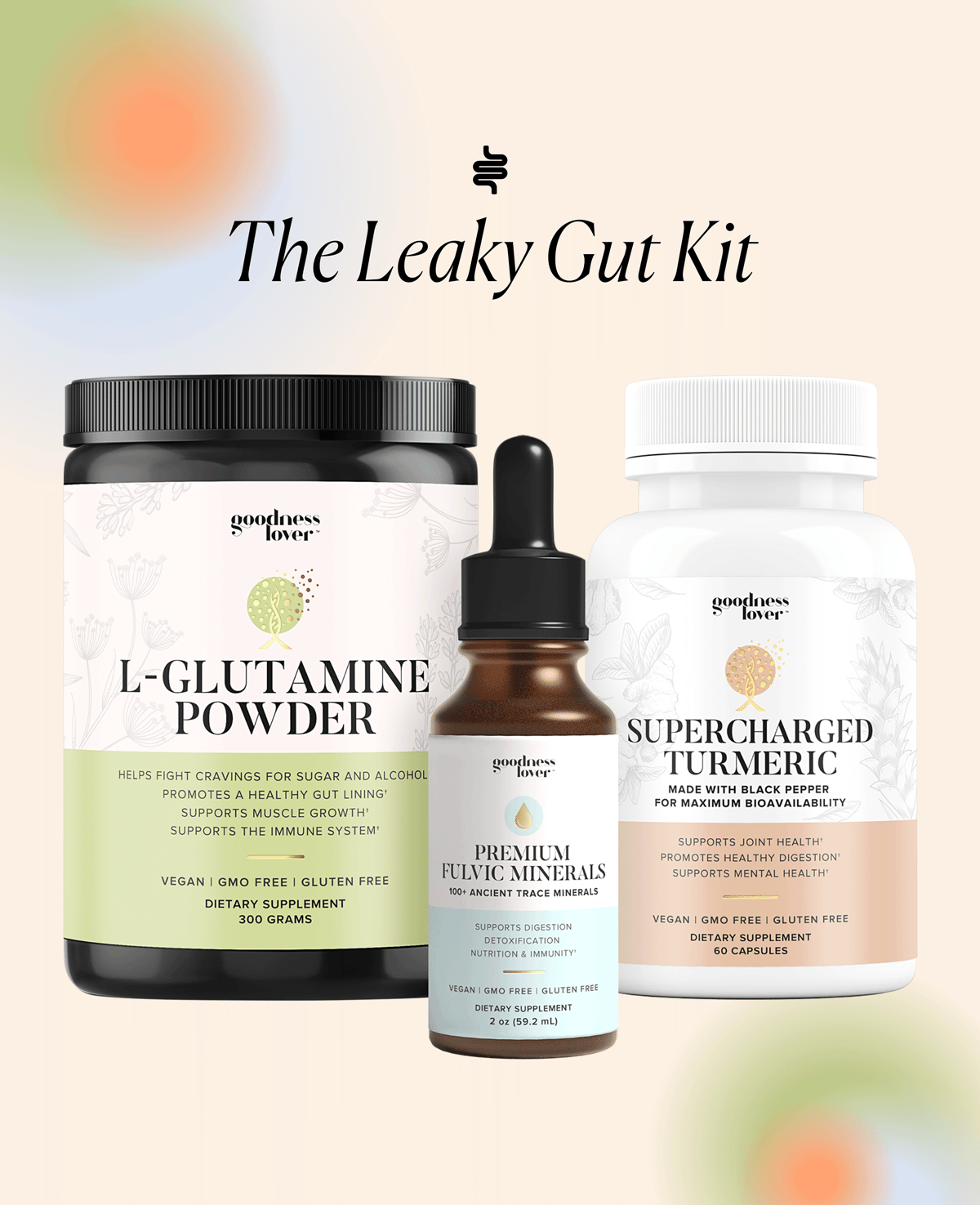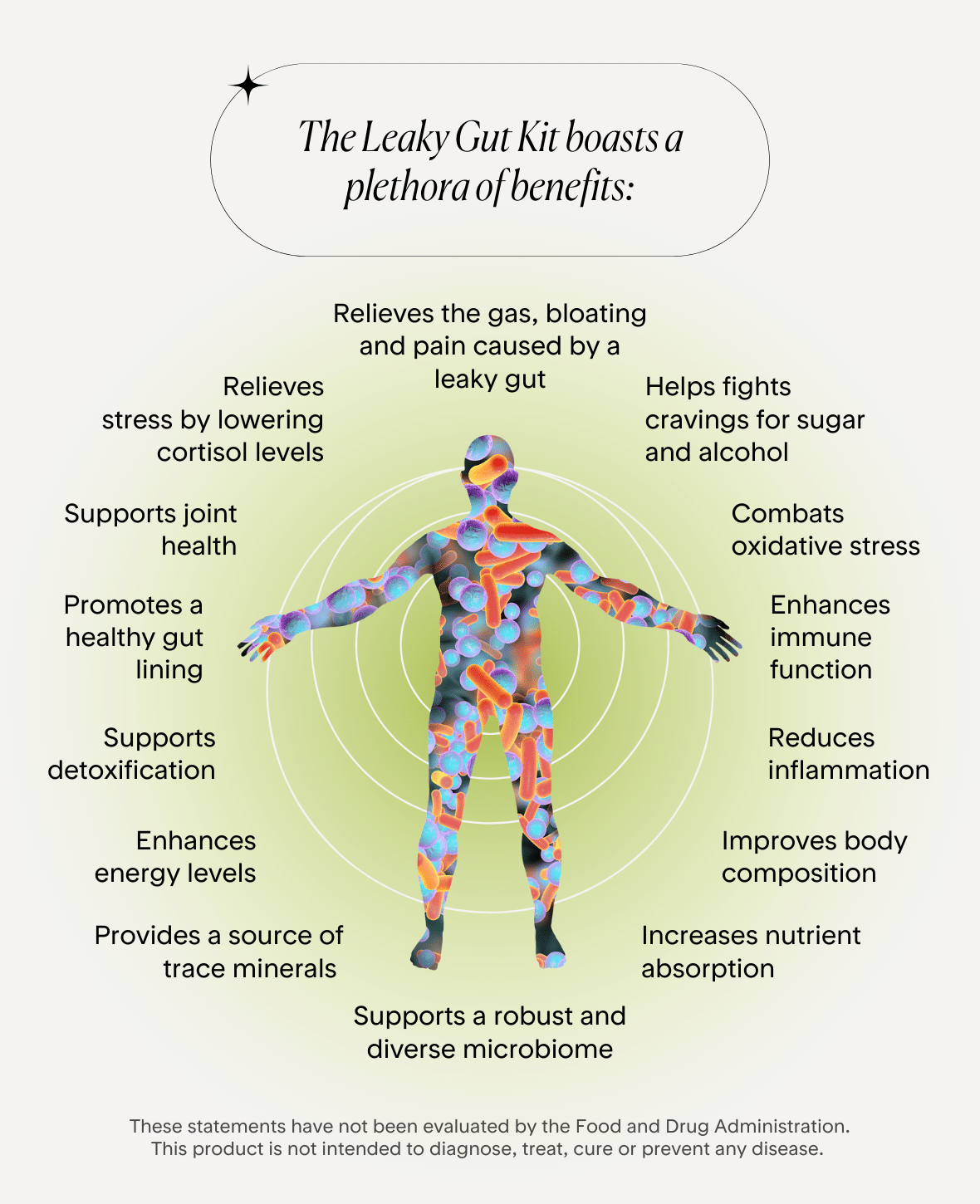Introduction
Our skin, particularly our face, is what we show to the world so of course we want it to look and feel nice! But so many of us struggle with good skin. Skin problems are not just restricted to our teenage years, but many people, particularly women, continue to struggle throughout adulthood as well.
Skin, being our largest organ, is connected to so many other systems in our body and can subsequently be impacted by many different factors. And while it is important to use the right topical ingredients on our face, it’s even more imperative to make sure that we’re addressing the root causes that are most likely happening within our bodies.
In the last decade or so, research has found that the health of our gut is fundamental to having clear, glowing skin! The gut includes everything from our mouth all the way to the anus- from entry to exit- and is responsible for various functions which can have a direct impact on skin health. It’s responsible for absorbing nutrients, housing both beneficial and harmful bacteria, regulating our moods, excreting waste just to name a few!
Imagine for example, your skin is like soil in a garden. It needs the right nutrient levels and bacterial composition and balance to support and nurture the plants to help them grow; for their leaves to be healthy and their flowers to blossom. For our skin to be strong, clear and radiant, we also need the right nutrient and bacterial balance in our gut.
So in what ways does our gut health affect our skin?
Absorption of Nutrients for Skin
The primary role of the gut is to absorb the nutrients from our food that our body needs for growth, repair, and normal functioning. When nutrients aren’t being absorbed properly for various reasons and are in short supply, the gut acts like our overall manager and begins to prioritise the departments or organs that need these nutrient resources the most. Our essential organs like our heart, brain and liver are the top dogs and get access to these nutrients first. Other “organs” like our hair, nails and skin sit a bit further back on the priority line and these are thus the first places we notice changes.
If the different functions that are required for proper absorption are not working properly, we may become deficient in certain nutrients that are vital for healthy skin including:
-
Zinc
-
Omega 3s
Another important nutrient for our skin is omega 3 fatty acids which have been shown to improve the skin barrier, reduce inflammation and hyperpigmentation, assist with dry skin and wound healing. They may even possibly protect against sun damage.
-
Vitamin A
Vitamin A is also an essential nutrient for the skin as it supports collagen production and controls keratin production (keratin is the substance that makes up most of our skin cells).
-
Vitamin C
Vitamin C also supports collagen production and is important for wound healing. It is also a great antioxidant that helps to fight against oxidative stress and free radical damage (free radicals are everywhere and we are exposed to hundreds of thousands of them everyday!)

Metabolism and Elimination of Toxins and Wastes
Our digestive system, liver and kidneys all work together to detoxify and eliminate the toxins we’re exposed to on a daily basis. Industrial pollutants, petrochemicals, heavy metals, pesticides, food additives, pharmaceuticals, cleaning products, hygiene products and cosmetics and plastic compounds are now a given part of everyday life. Whilst our bodies have a natural capacity to process and eliminate toxins, our systems are now under immense pressure from the level of assault inflicted from modern-day life. If our elimination systems are under functioning and we’re not able to remove the toxins via these channels, the toxins then try to make their way out via our largest organ in the body (the skin), leading to acne, dryness and other skin issues.
Dysbiosis
Dysbiosis is the term that refers to an imbalance of good and bad bacteria in the gut. It has the potential to negatively impact skin health in numerous ways. The bad guys in our gut for example, can lead to the accumulation of toxic metabolites, which can access our circulatory system, making its way around our body. These metabolites can accumulate in the skin and break down the integrity of the skin barrier, reducing the skin moisture content and decrease the production of healthy skin cells.
Dysbiosis can also activate the immune system and lead to inflammation. It is now known that inflammation precedes pustule development in acne sufferers. The amount and concentration of certain inflammatory cytokines is also linked to the severity of acne- the degree of dysbiosis also has the potential to influence the severity of the acne.
Leaky Gut
Dysbiosis can also lead to leaky gut which is the culprit behind many skin issues. Your gut wall is made up of lots of cells which are held together by “tight-junctions.” In a healthy gut, these tight junctions are impermeable, only letting the smallest molecules through the wall and into the bloodstream. However, pathogenic bacteria can damage these junctions meaning that contents of the gut, whether that’s harmful bacteria, food proteins, toxins or parasites are able to pass into the bloodstream where the immune system is then activated, leading to a host of problems throughout other parts of the body. Other things like alcohol, gluten, dairy, food additives and pesticides can also contribute to damaging the gut wall too.
Many autoimmune conditions as well as skin conditions are triggered by leaky gut syndrome. When these harmful substances enter the blood stream, the body looks for the quickest route to remove them and often the skin is the easiest and fastest option. The immune reaction that is triggered can also cause redness, swelling and breakouts.
The Neurological Connection
In many skin conditions, the gut-brain axis is also involved. Studies have revealed that there is a frequent association between mood disorders such as anxiety and depression, gastrointestinal complaints and skin conditions such as acne. Stress can impact the skin via our gut-brain axis in many ways. It has the potential to impact the production of neurotransmitters by our gut bacteria or trigger the release of neuro-chemicals such as substance P (an amino-acid peptide) from the specific intestinal cells. Substance P can go on to trigger inflammatory cytokines both locally and within the skin.6 This leads to greater permeability of the gut barrier and increased local and systemic inflammation.
Stress also causes our liver to convert carbohydrates to glucose (sugar), which leads to increased sugar circulating around the body, one of our skins’ worst enemies…
Insulin and Blood Sugar Levels
One of the main drivers in the pathology of acne vulgaris is high insulin levels. Elevated insulin is known to result in epithelial cell proliferation and increased sebum production, both risk factors for acne. Really, anything that causes a spike in blood sugar can increase both inflammation and insulin levels, leading to acne. The link between blood sugar levels and your skin is definitely one you’ll want to be aware of if you’re struggling with acne.
So what does this have to do with your gut?
Studies have shown that bad bacteria leaking through an impermeable gut wall can trigger an inflammatory response and significantly interfere with the effectiveness of insulin in managing your blood sugar levels. Insulin levels can also become elevated if you are not consuming enough fibre which is needed to help your body bind to hormones and toxins and shuttle them out of your system and to feed the good guys in your gut.

Hormonal Imbalance
Ever heard of the word “estrobolome” before?
Your estrobolome refers to the microbes in your gut that are responsible for metabolising estrogen. These microbes produce an enzyme called B-glucuronidase that turns estrogen into its active form so it can be recirculated throughout your body. When your microbiome is balanced, the estrobolome maintains a good balance of estrogen. However, if you have low microbial diversity, it can drive the production of estrogen in either direction.
Often it produces too much of this enzyme, allowing excess estrogen to be reactivated. When this happens, you end up with less active- or useful- estrogen circulating in your bloodstream and more bound or inactive estrogen ready for excretion. If your elimination pathways are overloaded, the bound estrogen gets recirculated, leading again to estrogen dominance and symptoms such as bloating, mood swings, breast tenderness and fatigue and last but not least, skin conditions such as acne. So supporting your gut microbiome and excretion pathways can therefore go a long way to avoid a build-up of excess estrogen and reduce your risk for bad skin.
Skin Signs of an Unhealthy Gut
It’s amazing how much the surface, your skin, can reveal about what’s going on underneath in your gut. You may have experienced at one time or another a skin irritation or allergy rash. Your skin is great at telling you when something may be off balance internally. Whether it’s inflammation, allergies, hormones or an imbalanced gut ecosystem, your skin will respond in various ways: rash, hives, breakouts or discolouration.
Whilst not every skin condition is directly related to the gut, it is astonishing that many are including:
-
Psoriasis
Psoriasis is an autoimmune disease which is directly related to the balance of bacteria in the gut and can worsen when the gut’s bacteria is off-balance.
-
Rosacea
A bumpy, red irritation on the face associated with bacterial overgrowth in the gut as well as a lack of hydrochloric acid
-
Eczema/Atopic dermatitis
Patients with eczema have different bacteria in their gut compared to people without eczema. Eczema is also associated with a malfunctioning immune system (70-80% of your immune system is in your gut), inflammation and leaky gut.
-
Acne
Acne has been associated with an imbalanced gut microbiome as well as insulin resistance (which is also affected by gut bacteria).
-
Dry skin
Most commonly caused by environmental factors but in chronic cases, can be directly linked with abnormal bowel movements or a lack of digestive enzymes.
-
Easy bruising
Even the ability to bruise easily has been associated with an imbalanced gut microbiome!
Okay okay, I’m convinced! Enough about how our skin is connected to the health of our gut! What can we do about it?

Some Tips on How to Heal Your Gut and Improve Skin Health
-
Eating Habits
Just as it’s important to watch what you eat, it’s equally important to watch how you eat as this can affect how much you absorb. When you eat, try sit down in a relaxed environment, chewing your food until it is completely pureed. Also try to avoid consuming large amounts of liquid 20 minutes before and after your meals, as this will dilute your digestive secretions and make them less effective. You could also, 15 min before your meals, drink a glass of water with 1 tsp of lemon water in it as this helps to stimulate your hydrochloric acid production ready for the digestion of food.
-
Prebiotic and Probiotic Foods
Eat plenty of probiotic containing foods such as sauerkraut, kimchi, kombucha, coconut yoghurt or take a good quality probiotic supplement. Also, eat foods rich in prebiotics which help to boost the growth of friendly bacteria. These include non-digestible food substances found in many fruits and vegetables such as asparagus, bananas, pears, endive, chicory, garlic, leeks and onions. The combination of prebiotics and probiotics helps promote a healthy gut more than either consumed alone.
-
Consume Plenty of Fiber
Eat a high fiber diet, including lots of fresh fruits and vegetables, whole grains, legumes, beans, nuts and seeds. Soluble fiber is especially important when it comes to skin health as it is important for the removal of waste, to manage your blood sugar levels and to move excess hormones out of your system, all of which can have a direct effect on the health of your skin.
-
Helpful Herbs
Some herbs that may aid digestion include fennel, chamomile, slippery elm, ginger, peppermint, dandelion root, gentian, licorice and garlic.
-
Avoid foods that damage your gut
As you have probably guessed, the worst offenders when it comes to gut and skin health are also the ones we tend to gravitate to the most. We’re talking processed foods such as cakes and packaged goods, refined sugars and sugary drinks, processed meats, alcohol and gluten. Sensitivity to dairy is also quite common which can lead to further damage of the gut.
-
Avoid your exposure to environmental toxins
Try to purchase organic foods where possible as they’re richer in nutrients and free of nasty chemicals. Use a water filter and opt for natural household cleaning products. Feed your skin with nutrient rich natural skincare and cosmetics to complete your holistic beauty routine for glowing, clear skin.
-
Learn some stress management strategies
Learning some ways to help cope with and manage your stress can go a long way in improving gut and skin heath. Spend time in nature, do regular exercise, try some meditation activities, practice deep breathing and make sure you’re getting plenty of sleep every night.
















What Do You Think? Comment Below: